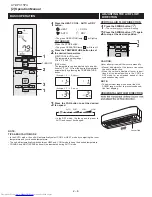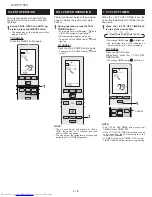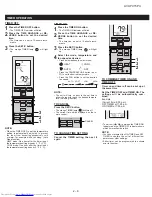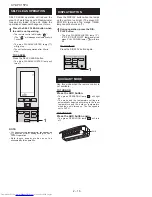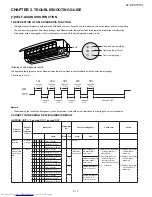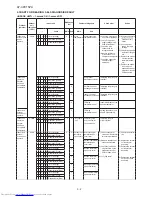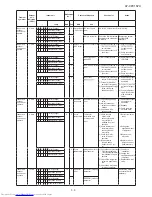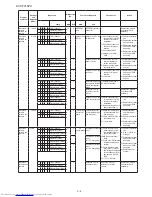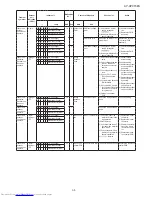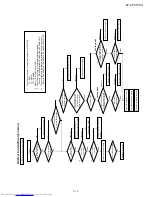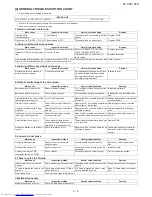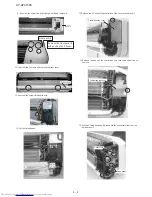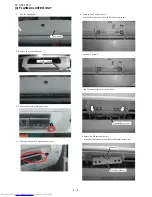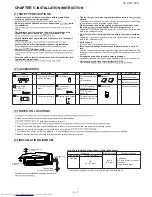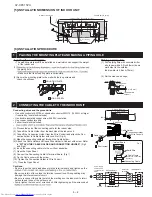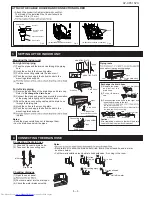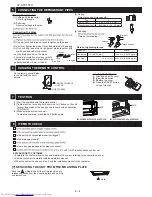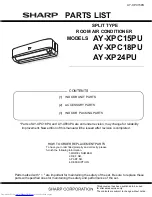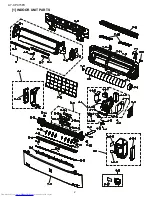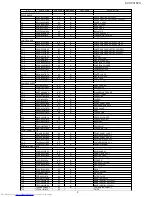
AY-XPC15PU
3 – 9
[4] GENERAL TROUBLESHOOTING CHART
1. Indoor unit does not turn on
2. Indoor unit fan does not operate
3. Indoor unit fan speed does not change
4. Remote control signal is not received
Main cause
Inspection method
Normal value/condition
Remedy
Cracked PWB.
(Cracked pattern)
Check visually.
There should be no cracking in PWB or
pattern.
Replace PWB.
Open-circuit in FU1 (250 V, 3.15 A). Check melting of FU1.
There should be no open-circuit.
Replace PWB.
Main cause
Inspection method
Normal value/condition
Remedy
Open-circuit in heat exchanger
thermistor (TH2) (in heating opera-
tion)
Measure thermistor resistance (dis-
mount for check)
Refer to THERMISTOR TEPERA-
TURE CHARACTERISTICS-1
Replace thermistor.
There should be no open-circuit or
faulty contact.
Replace thermistor.
Disconnected heat exchanger ther-
mistor (TH2) (in heating operation)
Inspect connector on PWB. Check
thermistor installation condition.
Thermistor should not be disconnected. Install correctly.
Main cause
Inspection method
Normal value/condition
Remedy
Remote control not designed to
allow fan speed change.
Check operation mode.
Fan speed should change except dur-
ing dehumidifying operation, ventila-
tion, light dehumidifying operation,
internally normal operation
Explain to user.
Main cause
Inspection method
Normal value/condition
Remedy
Batteries at end of service life.
Measure battery voltage.
2.5 V or higher (two batteries in series
connection)
Install new batteries.
Batteries installed incorrectly.
Check battery direction.
As indicated on battery compartment.
Install batteries in indicated direc-
tion.
*
These models have following thermistors.
The errors for the thermistors that are not mentioned above are irrelevant.
These indoor units don’t have power relay.
INDOOR UNIT
AY-XPC15PU, AY-XPC18PU, AY-XP24PU
TH1, TH2, TH3
5. Louvers do not move
6. There is noise in TV/radio
7. Malfunction occurs
Lighting fixture is too close, or fluo-
rescent lamp is burning out.
Turn off light and check.
Signal should be received when light is
turned off.
Change light position or install new
fluorescent lamp.
Use Sevick light (Hitachi).
Check if Sevick light (Hitachi) is
used.
Signal may not be received sometimes
due to effect of Sevick light.
Replace light or change position.
Operating position/angle is inap-
propriate.
Operate within range specified in
manual.
Signal should be received within range
specified in manual.
Explain appropriate handling to
user.
Open-circuit or short-circuit in wir-
ing of light receiving section.
Check if wires of light receiving
section are caught.
Wires of light receiving section should
not have any damage caused by pinch-
ing.
Replace wires of light receiving
section.
Defective light receiving unit.
Check signal receiving circuit
(measure voltage between termi-
nals 8 and 9 of connector CN7).
Tester indicator should move when sig-
nal is received.
Replace PWB.
Dew condensation on light receiv-
ing unit.
Check for water and rust.
Signal should be received within range
specified in manual.
Take moisture-proof measure for
lead wire outlet of light receiving
section.
Main cause
Inspection method
Normal value/condition
Remedy
Caught in sliding section.
Operate to see if louvers are
caught in place.
Louvers should operate smoothly.
Remove or correct catching sec-
tion.
Disconnected connector
Inspect connectors.
Connectors or pins should not be dis-
connected.
Install correctly.
Contact of solder on PWB
(connector section on PWB)
Check visually.
There should not be solder contact.
Correct contacting section.
Main cause
Inspection method
Normal value/condition
Remedy
Grounding wires not connected
properly.
Check grounding wire connections. Grounding wires should be connected
properly.
Connect grounding wires properly.
TV/radio is placed too close to out-
door unit.
Check distance between TV/radio
and outdoor unit.
If TV/radio is placed too close, it may
become affected by noise.
Move TV/radio away from outdoor
unit.
Other than above.
Check for radio wave interference.
Main cause
Inspection method
Normal value/condition
Remedy
Malfunction caused by noise.
Check for radio wave interference.


